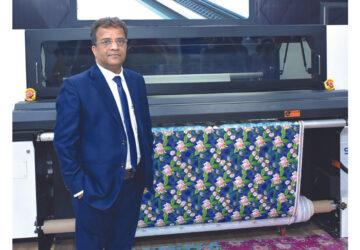 The LYCRA Company, a global leader in developing innovative and sustainable solutions for apparel, has announced its participation in seminars held during Performance Days Munich, March 20-21 in Germany. The seminars will explore the current state of polyester recycling from textile waste, and is hosted by Accelerating Circularity, an action-oriented non-profit organization focused on textile-to-textile recycling systems on a commercial scale.
The LYCRA Company, a global leader in developing innovative and sustainable solutions for apparel, has announced its participation in seminars held during Performance Days Munich, March 20-21 in Germany. The seminars will explore the current state of polyester recycling from textile waste, and is hosted by Accelerating Circularity, an action-oriented non-profit organization focused on textile-to-textile recycling systems on a commercial scale.
Jean Hegedus, The LYCRA Company’s Director of Sustainable Business Development, will be a panelist in the Recycled Polyester Database Launch session, held in the Reality Zone from 3:00 p.m. to 4:30 p.m. each day of the fair. The platform brings together polyester recyclers and fabric producers who are incorporating textile feedstocks into their processes and products.
Following the presentation, panelists will discuss the challenges of using textile waste and how to overcome them. Then they will break into groups to offer brands and retailers the opportunity to speak directly with providers in more detail.
The LYCRA Company has been a leader in the development of specialty polyester fibers made from textile waste, offering COOLMAX® and THERMOLITE® EcoMade fibers made from 100% textile waste since 2021. These fibers are of virgin equivalent quality, and are available in staple, filament and insulation forms and can be used in a broad variety of applications from performance wear to outdoor garments, to socks and ready-to-wear.
To help customers realize the benefits of sourcing products made from textile waste, last year The LYCRA Company launched “Waste for Good,” a new promotional campaign that features the tagline, “Don’t Waste this Opportunity.” The messaging promotes the advancement of circularity in the apparel and textile industry with COOLMAX® and THERMOLITE® EcoMade technologies.
“We are grateful to Accelerating Circularity for hosting this event and highlighting the need to move to textile waste as an input, thus setting the stage for our industry to close its own loop,” Hegedus said. “This is particularly important as recycled bottles are projected to be in short supply within the next few years, with bottling companies working to secure supply for their own recycling efforts.”
 The LYCRA Company, a global leader in developing innovative and sustainable solutions for apparel, has announced its participation in seminars held during Performance Days Munich, March 20-21 in Germany. The seminars will explore the current state of polyester recycling from textile waste, and is hosted by Accelerating Circularity, an action-oriented non-profit organization focused on textile-to-textile recycling systems on a commercial scale.
The LYCRA Company, a global leader in developing innovative and sustainable solutions for apparel, has announced its participation in seminars held during Performance Days Munich, March 20-21 in Germany. The seminars will explore the current state of polyester recycling from textile waste, and is hosted by Accelerating Circularity, an action-oriented non-profit organization focused on textile-to-textile recycling systems on a commercial scale.

















